Aravindh Raman
Collaborative Content Moderation in the Fediverse
Jan 10, 2025



Abstract:The Fediverse, a group of interconnected servers providing a variety of interoperable services (e.g. micro-blogging in Mastodon) has gained rapid popularity. This sudden growth, partly driven by Elon Musk's acquisition of Twitter, has created challenges for administrators though. This paper focuses on one particular challenge: content moderation, e.g. the need to remove spam or hate speech. While centralized platforms like Facebook and Twitter rely on automated tools for moderation, their dependence on massive labeled datasets and specialized infrastructure renders them impractical for decentralized, low-resource settings like the Fediverse. In this work, we design and evaluate FedMod, a collaborative content moderation system based on federated learning. Our system enables servers to exchange parameters of partially trained local content moderation models with similar servers, creating a federated model shared among collaborating servers. FedMod demonstrates robust performance on three different content moderation tasks: harmful content detection, bot content detection, and content warning assignment, achieving average per-server macro-F1 scores of 0.71, 0.73, and 0.58, respectively.
Decentralised Moderation for Interoperable Social Networks: A Conversation-based Approach for Pleroma and the Fediverse
Apr 03, 2024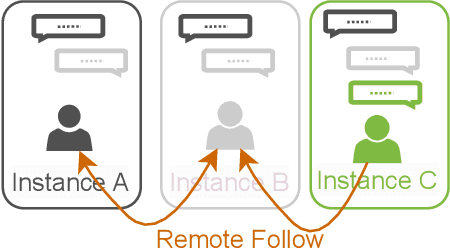



Abstract:The recent development of decentralised and interoperable social networks (such as the "fediverse") creates new challenges for content moderators. This is because millions of posts generated on one server can easily "spread" to another, even if the recipient server has very different moderation policies. An obvious solution would be to leverage moderation tools to automatically tag (and filter) posts that contravene moderation policies, e.g. related to toxic speech. Recent work has exploited the conversational context of a post to improve this automatic tagging, e.g. using the replies to a post to help classify if it contains toxic speech. This has shown particular potential in environments with large training sets that contain complete conversations. This, however, creates challenges in a decentralised context, as a single conversation may be fragmented across multiple servers. Thus, each server only has a partial view of an entire conversation because conversations are often federated across servers in a non-synchronized fashion. To address this, we propose a decentralised conversation-aware content moderation approach suitable for the fediverse. Our approach employs a graph deep learning model (GraphNLI) trained locally on each server. The model exploits local data to train a model that combines post and conversational information captured through random walks to detect toxicity. We evaluate our approach with data from Pleroma, a major decentralised and interoperable micro-blogging network containing 2 million conversations. Our model effectively detects toxicity on larger instances, exclusively trained using their local post information (0.8837 macro-F1). Our approach has considerable scope to improve moderation in decentralised and interoperable social networks such as Pleroma or Mastodon.
Scheduling Inference Workloads on Distributed Edge Clusters with Reinforcement Learning
Jan 31, 2023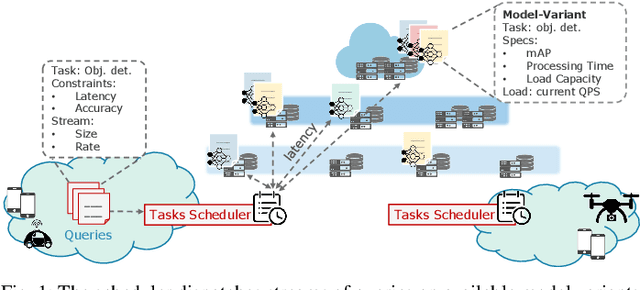
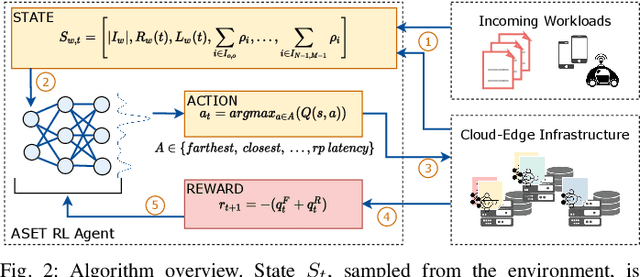
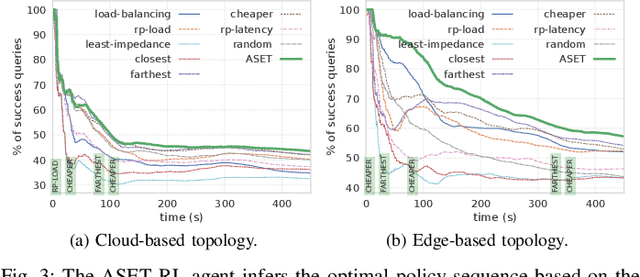
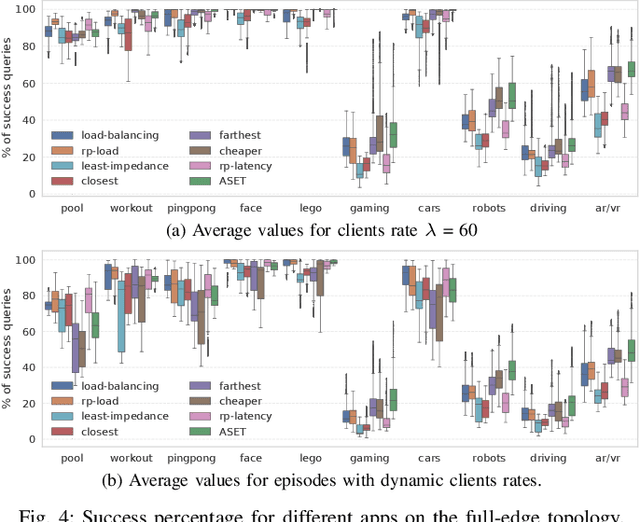
Abstract:Many real-time applications (e.g., Augmented/Virtual Reality, cognitive assistance) rely on Deep Neural Networks (DNNs) to process inference tasks. Edge computing is considered a key infrastructure to deploy such applications, as moving computation close to the data sources enables us to meet stringent latency and throughput requirements. However, the constrained nature of edge networks poses several additional challenges to the management of inference workloads: edge clusters can not provide unlimited processing power to DNN models, and often a trade-off between network and processing time should be considered when it comes to end-to-end delay requirements. In this paper, we focus on the problem of scheduling inference queries on DNN models in edge networks at short timescales (i.e., few milliseconds). By means of simulations, we analyze several policies in the realistic network settings and workloads of a large ISP, highlighting the need for a dynamic scheduling policy that can adapt to network conditions and workloads. We therefore design ASET, a Reinforcement Learning based scheduling algorithm able to adapt its decisions according to the system conditions. Our results show that ASET effectively provides the best performance compared to static policies when scheduling over a distributed pool of edge resources.
 Add to Chrome
Add to Chrome Add to Firefox
Add to Firefox Add to Edge
Add to Edge